Carl E. Olson's Blog, page 235
February 28, 2012
What is not subject to human government?
Fr. James Schall considers that question on the CWR blog:
In Article 4 of the 93d Question of Aquinas' "Treatise on Law," with a class, I read the following passage: "Those things are subject to human government, which can be done by man; but what pertains to the nature of man is not subject to human government; for instance, that he should have a soul, hands, or feet."
What's this "things not subject to human government" about?
Is there anything not subject to human government? The examples that Aquinas uses are striking. The fact that we have souls, hands, or feet is not subject to government. These attributes or parts of what we are were not the result of human legislation. In other words, what-it-is-to-be-a-human-being is not something that the government designs or causes, but rather finds. In other words, governments are limited by what-it-is-to-be-a-human-being. They reaffirm it but do not constitute it.
The next question that arises is this: Can human legislation claim to rule things which do not belong to its competency?
February 27, 2012
Remarks by G. K. Chesterton about the road to "compulsory contraception"
[My headline originally was, "Remarks by G. K. Chesterton on the road to 'compulsory contraception'". I suspect the meaning of that particular phrasing with either confusing, misleading, or otherwise unfortunate, especially since Chesterton never walked on such a road.]
The quote below is from The Wells and the Shallows, which Chesterton wrote near the very end of his life. In the passage, near the conclusion of the book, Chesterton responded to the misuse, or sloppy abuse, of the word "Catholic", and then criticized those Catholics who use the mantle of being "Catholic" to cloak or confuse their true intentions, which are contrary to what is really Catholic (goodness, does that sound familiar at all?). At the end of this excerpt, he noted that England of 1935 had a far more mild and jolly disposition, in general, than that 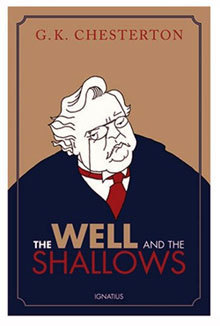 found in Prussia; but he lamented that this more civilized air was weakened by an "absence of a militant creed of Christian morals, and the power to define and defend." And he surmised that if "Compulsory Sterilisation or Compulsory Contraception really stalks through the modern State, leading the march of human progress through abortion to infanticide", the Germans would accept it with "barbaric joy", while the citizens of England will accept it meekly, "as something between well-trained servants and bewildered children."
found in Prussia; but he lamented that this more civilized air was weakened by an "absence of a militant creed of Christian morals, and the power to define and defend." And he surmised that if "Compulsory Sterilisation or Compulsory Contraception really stalks through the modern State, leading the march of human progress through abortion to infanticide", the Germans would accept it with "barbaric joy", while the citizens of England will accept it meekly, "as something between well-trained servants and bewildered children."
Without drawing exact parallels, Chesterton's observations of less than eighty years past are more than a little interesting in light of current events, especially the way in which some of the citizenry of our nation (the denizens of Planned Parenthood, NARAL, and other death merchants) have been reacting with barbaric joy at governmental measures meant to further their uncivilized kingdom, whereas many others are merely lowering their head and quietly, even meekly, accepting the directives from on high:
Touching Mr. C. E. Douglas, the smeller out of putrid paradoxes, I need only record that he complains of "an unhistorical use of the word Catholic," and assures us that we should be content with the fact that clergy of the national church are attached to nearly all our institutions, as a guarantee that "in theory, the Catholic religion is the official religion of the nation." I can only say that if he used his imagination about our point of view, as much as I try to use my imagination about his, it would, I think, dawn upon him that it is not altogether unreasonable in a real Catholic, or even a real Anglo-Catholic, to find this official reassurance a little thin.
Certainly, in that sense, there are "Catholic" priests attached to all sorts of things; there is a "Catholic" bishop preaching that science has destroyed the whole original Christian scheme; there is a "Catholic" dean who booms Birth-Prevention like a quack medicine; there is a "Catholic" canon who is ready to "break bread" apparently with anybody from Mormons to Moslems; at least I myself should rather prefer the Moslems. But I cannot believe that either Mr. Douglas or the Editor of the paper really regards that retrospective breakfast as a substitute for the Blessed Sacrament.
But though Mr. Douglas's view of our scruples is not highly sympathetic or discerning, there is one point on which Mr. Douglas endears himself to me, though I dare not hope that I am likely to endear myself to him. He may think what he likes about me, so long as he will go on thinking what he now thinks about Prussia. Because I classed Prussia with England among the Protestant countries, he protests against anything like a suggestion that they are the same sort of countries; and there I am warmly with him. They have certain negative things in common; but even in these it would be true to say that the Prussian prefers to be bullied where the Englishman only submits to be blinded.
But England is a thousand times jollier and more human as a national culture than Prussia; the disease is milder and the mood more healthy. But it is a mood which is weakened by the absence of a militant creed of Christian morals, and the power to define and defend. The test could best be made by the introduction of some of the new abnormal laws already threatening the world in the name of science. Suppose something of the type of Compulsory Sterilisation or Compulsory Contraception really stalks through the modern State, leading the march of human progress through abortion to infanticide. If the heathens in North Germany received it, they would accept it with howls of barbaric joy, as one of the sacred commands of the Race Religion; the proceedings very probably terminating (by that time) with a little human sacrifice. If the English received it, they would accept it as law-abiding citizens; that is, as something between well-trained servants and bewildered children. There is a great difference; but not so great as the certainty that the Irish would not accept it at all.
As for accepting falsehoods and coercion with the naivity and meekness expected of a good, law-abiding citizen, consider the recent words of race-car driver/model Danica Patrick (reportedly a practicing Catholic) when asked about the HHS mandate: "I leave it up to the government to make good decisions for Americans." That, I submit, is a powerful example of blind faith. Fortunately for Catholics, faith is not a matter of being blind—especially not when it comes to matters of government. If modern history has a good lesson for us, it is "Don't let strangers who live far away and who have a nose for power and money take complete control over essential matters related to your life, liberty, rights, and beliefs."
Besides, aren't we as Americans supposed to be self-governing? And doesn't some document or another say something such as, "Congress shall make no law respecting an establishment of religion, or prohibiting the free exercise thereof..."? Not to pick on Patrick, who seems like a very smart lady who just might be trying to avoid making waves (and who may have been put on the spot with a political question). But I think she fails to understand, as Mark Steyn notes in a recent column, that the issue of rights cannot just be meeky and blindly entrusted to those elected, as if they somehow are infused with great holiness and profound wisdom upon entering the halls of governmental power:
The transformation of "human rights" from restraints upon state power into a pretext for state power is nicely encapsulated in the language of Article 14 of the Charter of Fundamental Rights of the European Union, which states that everyone has the right "to receive free compulsory education." Got that? You have the human right to be forced to do something by the government. ...
This perversion of rights is killing the Western world. First, unlike real rights — to freedom of speech and freedom of religion — these new freedoms come with quite a price tag. All the free stuff is free in the sense of those offers that begin "You pay nothing now!" But you will eventually. No nation is rich enough to give you all this "free" stuff year in, year out.
Read more. Also see, on Ignatius Insight, "I despise Birth-Control", which is Chesterton on babies and distributism.
"Extreme Makeover" praised by Dr. Laura Schlessinger as "required reading"
Teresa Tomeo, author of Extreme Makeover: Women Transformed by Christ, Not Conformed to the Culture, recently was a guest on Dr. Laura's radio program. You can listen to the 16-minute segment, which aired on February 16, on the program's website.
In the course of the interview, Dr. Laura had these words of praise for Tomeo's book:
"Extreme Makeover is an unusual, incredible, intelligent, well-written balance of practical, everyday secular information within a religious structure. That is unique; I'm impressed."
"Everybody … (Extreme Makeover) is required reading. I don't care what your religion is; this is required reading."
For more about Extreme Makeover, including an excerpt and videos, visit the book's website.
The AP reports on converting from Catholicism to ...
... "Southern Baptism". Which is rather funny. Especially at 3:00 am.
Other conversions that might be interesting to witness, even if from a safe and wary distance:
• From Methodism to Scientologistism
• From Buddhism to Agnosticalism
• From Mormonism to Hinduitism
• From Presbyterianism to Palestinianism
• From Lutheranism to Easternism Orthoproxy
• From Atheism to Satanalyticalism
• From Free Jazz to Neo-Prog Rocketism
I could do this all night. But, instead, I'm converting to Fallasleepism....zzzzz...
Eating Bitterness: Catholics in China

Eating Bitterness: Catholics in China | Anthony E. Clark | Catholic World Report
"Clark on China": An Introduction
In this Catholic World Report column, I will be providing monthly reports on the situation of the Church in China. Today, China has the world's fastest growing economy, the fastest growing cities, the second fastest growing population, and probably the fastest growing number of Christians. When Chairman Mao Zedong declared the establishment of the People's Republic in China in 1949 there were around four million Christians in China. Today, 63 years later, there are around 70 million.
I was in China a few months ago with several Catholic friends, with whom I discussed the situation of the Church in that country, prayed, and visited new places with histories both sad and joyful. During my many visits to China over the years, I have learned that faith is strong there, perhaps—who am I to judge?—even stronger than in my own country. In a country ostensibly cut off from the Holy Father, I have seen a deeper commitment to him than I have in any other place. In a country seemingly divided into two Catholic communities I have seen greater unity than I have observed elsewhere.
And in a country where Catholics have lived a life of, as they say, chiku ("eating bitterness"), I have seen countless faithful bear witness to Henry David Thoreau's remark, "The smallest seed of faith is better than the largest fruit of happiness."
It would be easy to write a column each month on the "suffering Church" in China—reporting arrests, church closures, and state-Church tensions. But that would be a misrepresentation of what Catholic life is like in China today in the 21st century. It would also be easy to read official state sources about religion in China and report on how China's Catholics are thriving and happy under their new state leaders. But I shall attempt to report on what is really happening in China's Catholic Church, taking as my motto Flannery O'Connor's insightful quip, "The truth does not change according to our ability to stomach it."
The Church in China Today
In the opening line of his 2007 encyclical, Pope Benedict XVI began with the words of St. Paul to the Romans: "Spe salvi facti sumus," in hope we were saved. I think that one of the more positive trends in the Church in China today is the trend toward a sense of hope. And it was Benedict XVI who, on February 18, 2012, bestowed the red hat to Hong Kong's Bishop John Tong, making him a cardinal. It marked an important moment in the future of the Catholic history of China; Tong is only the seventh Chinese man to be elected a cardinal in the history of the Catholic Church, and he is the first Hong Kong-born Chinese to receive this honor. Cardinal Tong's appointment is significant, not only as he is in many ways the successor of his influential Chinese predecessor, Joseph Cardinal Zen, but because Tong is uniquely informed regarding the state of the Church in China today.
CWR Film Review: "October Baby"

Film Review: October Baby | Michael J. Miller | Catholic World Report
October Baby is a remarkable work of art, a ground-breaking film that sympathetically introduces the human beings involved in a very sad but ultimately uplifting story about abortion and adoption.
The film begins with a sun-drenched evocation of childhood, followed by a clever twist on an old-fashioned damsel-in-distress sequence: Hannah, a nineteen-year-old college student, collapses in full view of a crowd of spectators. While in the hospital for observation she makes two dramatic discoveries: first, that her devout Baptist parents, Dr. and Mrs. Lawson, had adopted her, and then that the multiple health problems she has suffered from since infancy have a common cause. She was born prematurely after a failed attempt at abortion.
Reeling from the impact of these revelations, Hannah reacts hurtfully, as many young people do when they discover that life is unfair. At the invitation of an old friend, she decides to join a half a dozen other students who set off in an antique van to spend spring break in New Orleans. On the way, Hannah plans to visit her birthplace, Mobile, Alabama, to find some answers. Meanwhile the hapless travelers have a brush with the law. The gently comic scenes between the childhood friends are sweet, and there is sly humor in the quirks and foibles of the secondary characters.
The challenging themes of October Baby are offset by the gorgeous cinematography and the evocative but unobtrusive musical sound track. The writer and director, brothers Jon and Andrew Erwin, had previously collaborated on several Christian music videos, and they deploy their talents skillfully and sensitively in their first feature-length film.
February 25, 2012
Deluges and Deserts, Sin and Salvation
A Scriptural Reflection on the Readings for Sunday, February 26, 2012, the First Sunday of Lent | Carl E. Olson
Readings:
Gn 9:8-15
Ps 25:4-5, 6-7, 8-9
1 Pt 3:18-22
Mk 1:12-15
Lent is a season of challenges and extremes, a dramatic confluence of opposites. As evidence, I offer Exhibit A: today's readings, which contain stories about deluges and deserts, sin and salvation, and water that destroys—and saves. All of it is heady stuff, certainly, but it is aimed at the heart, meant to help us embrace more tightly and cherish more deeply the eternal purpose of our lives.
What does the story of the flood and Noah's ark have to do with Jesus being tempted in the desert? The first connection is sin. The flood was necessary because "In the eyes of God the earth was corrupt and full of lawlessness" (Gen 6:11). Seeing the corruption and depravity of man, God told Noah, "I have decided to put an end to all mortals on earth; the earth is full of lawlessness because of them. So I will destroy them and all life on earth" (Gen 6:13). Although Jesus was sinless, he saw and felt the effects of sin. After being baptized, he went into the desert to directly confront the temptations of Satan, the Evil One responsible for bringing sin and death into the world.
This brings us to the second connection, which is a time of trial. The destruction of wickedness on earth, God told Noah, would require forty days and nights of rain (Gen 7:4, 12). That number, in both the Old and New Testaments, is closely connected with times of trial, hardship, and punishment, including the forty years the Israelites spent in the wilderness after the Exodus, made necessary by their sin and rebellion (Num 14:26-35).
The forty days spent by Jesus in the desert was a reenactment of those forty years. But while the people had failed to obey the word of God, Jesus obeyed completely. Whereas they had continually complained, Jesus complied with humility. And while Moses was not allowed to enter the Promised Land, Jesus ushered in the Kingdom of God.
The third connection is covenant. Following the flood, as we hear in today's Old Testament reading, God told Noah that he was establishing a covenant "between me and you" and "between me and the earth." This was one of several covenants, each of them an invitation from the loving Creator for man to enter into "intimate communion" with him (Catechism of the Catholic Church, pars 54-73). The new and everlasting covenant, the perfect culmination of this plan of salvation, was established by the life, death, and resurrection of the God-man.
Finally, there is the connection of water and baptism. In the time of Noah, sinful men were destroyed by water even while the righteous man (and his family) was saved by that same water. In baptism, as today's epistle explains, the flesh—that is, the old man—is put to death, while a new man emerges from the sacramental waters. "For Christ, being the first-born of every creature," wrote Justin Martyr in his Dialogue with Trypho, "became again the chief of another race regenerated by Himself through water, and faith, and wood, containing the mystery of the cross; even as Noah was saved by wood when he rode over the waters with his household."
Jesus, after being baptized—and thus preparing the waters of the world for our baptisms—faced the Tempter and then announced the Kingdom of God. In doing so, he proclaimed, in word and deed, that sin and wickedness would be dealt a fatal blow, which was soon delivered through his own suffering, death, and triumphant emergence from the tomb.
During his time in the desert, Jesus prayed and fasted. Pope Benedict XVI, in his [2009] message for Lent, reminded us that the true fast is "directed to eating the 'true food', which is to do the Father's will (cf. Jn 4:34)." Noah was saved because he chose holiness over earthly pleasures. Jesus brought salvation by choosing the Father's will over the devil's lies. The challenge of Lent is to choose holiness and hunger for the true food.
(This "Opening the Word" column originally appeared in the March 1, 2009, edition of Our Sunday Visitor newspaper.)
February 24, 2012
Taking directives from Nancy Pelosi on conscience and consistency is like...
... taking advice from Charlie Sheen on marriage and monogamy. Watch the short clip posted by CNSNews.com, from an event held this past Monday at Texas A&M. Let's take a quick look at the statements made by Pelosi in the clip:
A decision about the size and timing of your family is really personal. And that's a matter of conscience for each person.
Pelosi believes, then, that the deeply personal decision about the "size and timing" of one's family is a matter of conscience, but the aborting of babies is a matter of necessity and "women's health", as indicated by her 100% NARAL rating and unremittingly and very public pro-abortion stances. Not to mention her wild and slanderous insistence, last October, that opposition to abortion provisions in Obamacare proves that pro-life Republicans are heartless, women-hating oafs: "Under this bill [that would have removed abortion from Obamacare coverage] when the Republicans vote for this bill today, they will be voting to say that women can die on the floor and health care providers do not have to intervene if this bill is passed."
Here's the deal: Pelosi has made an entire career out of outlandish, ridiculous, false, and hideous statements because it works. And she gets away with it. Again and again and again.
So in her twisted, contraceptive-worshipping world, the Church's historical, logical, and principled stand against contraceptives (and abortion) is an affront to conscience, while the willful thwarting of procreation is a most sacred and deeply personal act, tantamount to Moses climbing up Mount Sinai, except in this case it is donning of a condom or the use of chemicals that facilitates the magical moment of sterile, self-centered pleasure.
Ninety-eight percent of women in childbearing age that are Catholic use contraception.
False. As even the Washington Post pointed out. But let's not allow facts to interfere with The Great Contraceptive Awakening! That simply won't do. It's also beside the point. To paraphrase Chesterton, the truth doesn't change because 20% believed a falsehood on Monday and now 80% believe a falsehood on Friday.
So, in practice the church has not enforced this and now they want the federal government and private insurance to enforce it. It just isn't consistent to me.
Uh, perhaps because that might be the most asinine and perversely twisted sentence ever uttered by Pelosi, which is quite the (dubious) accomplishment, especially since she also recently said about the HHS mandate: "I am going to stick with my fellow Catholics in supporting the Administration on this. I think it was a very courageous decision that they made, and I support it..." The Church is just standing there, minding it's own business, and Big Brother N. Government comes along and says, "You need to pay for your employees to do This, That, and the Other Thing". When the Church refuses, B.B.N. Government says, "Do it, or face massive fines and other possible punishments." And Ms. Pelosi interprets this as the Church wanting the Government to enforce This, That, and the Other Thing.
Two questions: Why hasn't her bishop said anything? And why hasn't her high school revoked her diploma?
As Michael Warsaw, president of EWTN, wrote in The New York Times, the mandate is simply coercive:
Earlier this month, in response to widespread opposition to the mandate, the president announced an "accommodation" for some religious organizations — like, potentially, EWTN — that would shift the responsibility for the coverage from the employer to the employer's insurance carrier. But this would do nothing to solve the problem. First, EWTN self-insures, so we are the insurer. Second, even if we had an outside insurer, we would still be in the untenable position of facilitating access to drugs that go against our beliefs. And if we refused to comply with the directive, we could be hit with annual fines starting at around $600,000.
The administration's supporters say that by opposing the rule, religious employers like EWTN are guilty of trying to coerce our employees and impose our values on them. But we are simply choosing not to participate in the use of these drugs. Our 350 employees, many of whom are not Catholic, freely choose to work here and can purchase and use contraception if they want to. They are aware of the values we practice, and I hear regularly from Catholic and non-Catholic employees alike how much they love working for an organization that is defined by its Catholic beliefs — beliefs that we think result in a better workplace and more expansive benefits over all.
Instead, it is the government — which does not accept EWTN's religious choice and can punish that choice by imposing fines — that is coercing us.
But, of course, Pelosi has mastered the wretched rhetoric that dominates this post-modern, rubberized funland, presenting herself as martyr and victim:
Whatever my personal beliefs or my personal upbringing are on this subject everyone has their own responsibility in terms of the size and the rest of their family. So, I think this should be removed from the debate, it's inflammatory--misrepresentations are made...
Yes, they sure are. How do I know? Pelosi's lips are moving. Finally:
I want to say this—maybe overstating, I can't speak for everyone—but there's a sisterhood, there's a sisters under the skin understanding of this issue among women...
What is that? The Sisterhood of the Traveling Tramps? At least one feminist openly says, "Yes!" and admits what is really going on:
"When deeply-settled rights are most in danger, it's not the time to euphemize, or retreat from assertions of sexual liberty and self-governance. It's time to gun it instead," she declared.
"So here's the subject I advocate for, because no one dares to speak her name: It's the 20-something unmarried heterosexual woman who wants to have sex, has sex, enjoys a good sex life with her boyfriend, and, in that sex life, uses birth control. Or, she accidentally gets pregnant."
"I advocate for the slut who sleeps with lots of men, as well as the woman who sleeps with only one, ever. Promiscuously heterosexual, and happy about it? I've got your back."
And Pelosi has hers. Meanwhile, Pelosi continues to stab the Church in the back. And the front. With impunity.
• The bishops are standing up to the President. But what of Pelosi? (Feb. 8, 2012)
New books and films at 20% off at www.Ignatius.com

Offer ends Tuesday February 28th, 2012 at 12:00 midnight EST.
These prices are available online only through Ignatius.com
New Books and Films, plus great items at great discounts!
Great new books are hot off the press! My Brother, The Pope is a unique, intimate look into the life of Pope Benedict XVI told by his brother, Msgr. Georg Ratzinger. Trace the rich history of the Shroud of Turin and the Veil of Manoppello in The True Icon by best-selling author Paul Badde. And be sure to read the powerful, timely book Indivisible (Catholic edition) with many crucial insights to help restore faith & freedom before it's too late! With these and other exciting new titles, including some great films, we have something for everyone at 20% off!
The Ignatius Press Lent sale is going on right now! Encyclicals by Pope Benedict XVI are 30% off and Jesus of Nazareth, Volume 2 is priced at $19.95. The Death of a Pope by Piers Paul Read - a "faith-driven theological thriller" - is now only $4.95 and Poor Banished Children - a "A soulful, beautifully written, and haunting novel" - is now available for $8.50! Take advantage of these low prices today, and make sure to check our entire listing of sale items here.
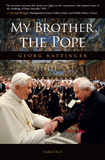 My Brother the Pope
My Brother the Pope
Georg Ratzinger, Michael Hesemann
This book is a unique window on an extraordinary family that lived through the difficult period of National Socialism in Germany. Those interested in knowing more about the early life of Benedict XVI will not be disappointed. They will also learn of the admirable character and inspiring example of the parents, and see how the Catholic faith can shape not just a family, but an entire culture-in this case, that of Bavaria. Georg's reminiscences are detailed, intimate, and warm. And while they begin with the earliest years of the Ratzinger family, they continue right up to the present day.
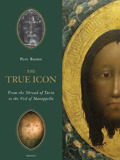 The True Icon
The True Icon
From the Shroud of Turin to the Veil of Manopello
Paul Badde
In this lavishly illustrated book, best-selling author Paul Badde sets out on a journey through Europe and the Holy Land as he traces the rich history of the Shroud. With the investigative skills of a seasoned journalist, Paul Badde uncovers many of the mysteries surrounding the Shroud and also researches another relic honored as a burial cloth of Christ-the Veil of Manoppello, which bears the image of the Holy Face.
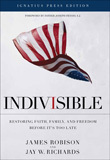 Indivisible
Indivisible
Restoring Faith, Family and Freedom Before It's Too Late
Jay Richards, James Robison
In Indivisible, Jay Richards and James Robison tackle tough moral and political issues facing Christians today, including abortion, stem cell research, marriage, education, economics, health care, the environment, judicial activism, terrorism, free trade and more. Written to appeal to a broad spectrum of believers, Indivisible provides simple, clear arguments that Christians can use to support their beliefs in public settings.
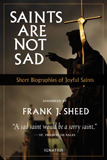 Saints Are Not Sad
Saints Are Not Sad
Short Biographies of Joyful Saints
Frank Sheed
"The only tragedy is not to be a saint", wrote the French novelist Léon Bloy. And St. Francis de Sales said that "A sad saint would be a sorry saint." But what is a saint? One way to answer is to analyze sanctity, theologically and psychologically. Another way, which is the path Frank Sheed chose in creating this volume, is to show you a saint-or rather, since no two saints are alike-to show you a number of saints. In this book, you are shown forty saints.
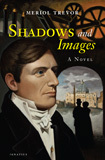 Shadows and Images
Shadows and Images
A Novel
This is the story of a Protestant young woman and her journey to the Roman Catholic Church. The fascinating novel is set in nineteenth-century England-a time when Catholicism was regarded with suspicion and prejudice against Catholics was commonplace. Leaving her sheltered life in the countryside, young Clem becomes acquainted with the fascinating ideas and people of Oxford-including a brilliant young clergyman, John Henry Newman. But when her relationship to a Roman Catholic man with a colorful reputation leads to an Italian elopement that is more innocent than it appears, the scandal drives a wedge between Clem and the upright Anglican circle of friends and family she left behind. Woven into the story of Clem and Augustine, their courtship and marriage, and Clem's conversion, is the vital, influential, and holy Newman, as seen through the eyes of friends.
We Have Found Mercy
The Mystery of God's Merciful Love
Christoph Cardinal Schoenborn
The Archbishop of Vienna explores the presence of God's great mercy in the Scriptures, Tradition, the life of Christ, and the sacraments and works of the Church, while raising important questions along the way, such as, "What is the relationship between mercy and justice?"
Saint Helena and the True Cross
Louis de Wohl
Set against the colorful background of power struggles in imperial Rome and battling Roman legions, this is the exciting story of St. Helena, mother of the Emperor Constantine, who found the Cross of Christ in Jerusalem. This book for young people paints a vivid portrait of a remarkable woman who overcame every obstacle with faith, hope, perseverance... and a healthy dose of ambition.
DVDs
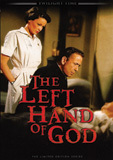 The Left Hand of God
The Left Hand of God
The first DVD release of this Humphrey Bogart classic, re-mastered in a limited collector's widescreen edition. Set in 1947 civil war-torn China, Bogart plays Jim Carmody, a downed American flier taken prisoner by Chinese warlord Mieh Yang (Lee J. Cobb), who gives the skilled Carmody limited freedom to lead a group of his guards. After witnessing the brutal killing of a missionary priest on his way to a neighboring village, Carmody escapes, using the dead priest's clothes and supplies for his disguised identity. Making his way to the remote village, he is faced with the challenge of acting as the new priest the people were expecting, and how to help the poor villagers in their need.
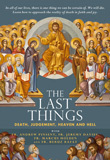 The Last Things
The Last Things
Death, Judgement, Heaven and Hell
For each and every person in this world, through all the trials and uncertainties, there is one thing we can all be certain about: we will die. This film presents the reality of death and what will follow for every person: first the particular Judgment before God, then Heaven or Hell as our destination for all eternity. The Catholic teaching on Purgatory is also explained, giving examples from the Scriptures and philosophy.
 The Way
The Way
A powerful and inspirational story about family, friends, faith and the challenges we face navigating this complicated world. Martin Sheen plays Tom, an American doctor who comes to France to collect the remains of his adult son (Emilio Estevez), killed in a storm in the Pyrenees while walking the famous Camino de Santiago, "The Way of St. James." Tom decides to embark on the historical pilgrimage to honor his son's desire to finish the journey, unprepared for the profound impact the journey will have on him. Also available on Blu-Ray.
The Mighty Macs
From the inspiring true story comes the tale of one woman who just wanted to make a difference and wound up making history! When Coach Cathy Rush arrives at tiny Immaculata College, the women's basketball team has no budget, no uniforms and no gym. Refusing to give up, Cathy finds help from a young nun named Sister Sunday . Together, their relentless drive reignites the team's spirit and the Mighty Macs start conquering bigger and better-funded schools.
Courageous
Four men, one calling: To serve and protect. As law enforcement officers, they are confident and focused, standing up to the worst the streets can offer. Yet at the end of the day, they face a challenge they're ill prepared to tackle: fatherhood. Sherwood Pictures, creators of Fireproof, returns with this heartfelt, action-packed story. Also available in Blu-Ray.
There Be Dragons
Dougray Scott leads an acclaimed cast in Oscar® Nominee writer/director Roland Joffé's epic story of passion, faith and betrayal. When journalist Robert Torres (Scott) is assigned to write a book about Josemaría Escrivá (Charlie Cox), the controversial founder of Opus Dei, he hopes it will bring him closer to his father (Wes Bentley), Escrivá's chilhood friend. As Torres uncovers more about his father's past, he learns dark secrets that will change his world forever. Also available on Blu-Ray.
Life After Abortion
The untold story from the other victims of abortion. Countless women (and men) have been overwhelmed by post abortion trauma, resulting in fear, anxiety, pain, and guilt. Many suffer in silence for years, even decades after they realize the full toll of their choice. Go beyond the rhetoric and take a 360 degree look at unplanned pregnancies as told by the women who experienced them. From desperation to devastation to deliverance, Life After Abortion takes an honest look at the undeniable impact abortion has had on real people.
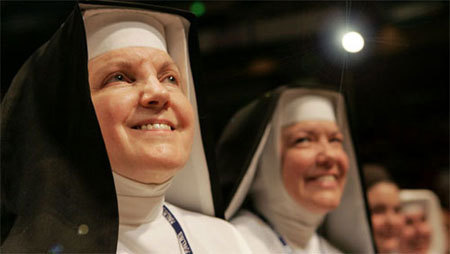 The Apostolic Visitation in Historical Perspective: An interview with Sister Dolores Liptak, RSM
The Apostolic Visitation in Historical Perspective: An interview with Sister Dolores Liptak, RSM
By Ann Carey
Sister Dolores Liptak, a Sister of Mercy of the Americas, was invited by Mother Mary Clare Millea, ASCJ to be a consultant for the recently concluded apostolic visitation of US women religious. Sister Dolores specializes in the history of the Catholic Church in United States and holds a doctorate in American history from the University of Connecticut.
Sister Dolores spoke recently with Ann Carey for Catholic World Report about her perspective on the apostolic visitation of women religious, which was launched in 2008 and which concluded with the presentation of its findings to Archbishop Joseph Tobin, secretary of the Vatican's Congregation for Institutes of Consecrated Life, in early 2012.
An excerpt from Msgr. George Ratzinger's book, "My Brother, the Pope"...
... has been posted on ZENIT. Here is the first part:
From Chapter IX: Pope
Like probably most Catholics, I, too, attentively followed the last days of John Paul II. I was aware that a great life was coming to an end in a completely organic way. Everyone sensed that he would not recover again from this final illness, yet it was all the more admirable how patiently and calmly he 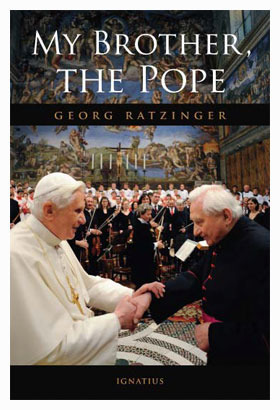 endured it. He even cheered up the people who had come to Rome, and somehow, for all his despondency about his own helplessness, he also radiated joy and confidence that he would soon be with his Heavenly Father. So it was a worthy end of a great personage, whose work was to continue from now on "over there".
endured it. He even cheered up the people who had come to Rome, and somehow, for all his despondency about his own helplessness, he also radiated joy and confidence that he would soon be with his Heavenly Father. So it was a worthy end of a great personage, whose work was to continue from now on "over there".
What I admired very much were the many young people who spontaneously set out for Rome so as to manifest once more their solidarity with this great pope. It is always said that the youth want nothing to do with the Church, but this was strikingly disproved at that time. On the contrary, there are many young people, too, who are spontaneously attracted by the Church, once they have experienced that the everyday routine cannot answer their questions and cannot give any meaning to their lives, that this other thing, faith, is needed for that.
During the next two weeks, I was repeatedly asked by people, and by journalists too, whether my brother would become pope. My answer was always the same: "No, he certainly will not!" The conclave would never elect a man at his age – he was just turning seventy-eight. It was different in the case of John XXIII, because his predecessor, Pius XII, had not held a consistory during his last five years in office and had not appointed any new cardinals. The College of Cardinals was therefore more or less aging then, so that they were forced to elect an older candidate, who at the age of seventy-six, almost seventy-seven, was nevertheless a good year younger than my brother at the time of the 2005 conclave. Now, though, the College of Cardinals was as strong as it had ever been at a conclave; there had never been so many cardinals. There were many great and talented men of all ages among them, so there was really no need to elect one of the oldest. Therefore, it was quite clear to me that a younger man would be the next pope.
I even experienced the "Habemus Papam" live. At the time I was called by a journalist who said she had just heard that white smoke had gone up in Rome and wanted to hear from me whether I knew anything more specific. "No," I answered truthfully, "I know nothing." Then I turned on the television and heard it there, like everybody else.
Then in fact the name Ratzinger was mentioned! I must quite honestly say that at that moment I was rather disheartened.
Read the rest on the ZENIT site. The book is available for order from Ignatius Press. I recently received a copy, and it is a very handsome book with some wonderful (and, I suspect, rarely seen before) photos; I've yet to read very much of it. But over the coming weeks, I'll be posting some more excerpts from the book here on Insight Scoop, as well as excerpts from other new releases.
Carl E. Olson's Blog
- Carl E. Olson's profile
- 20 followers



